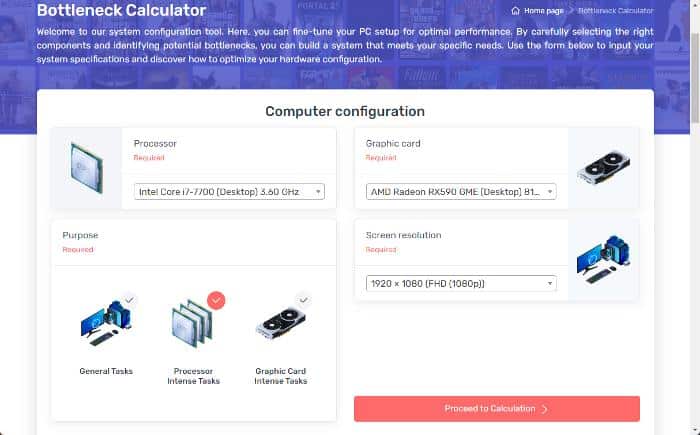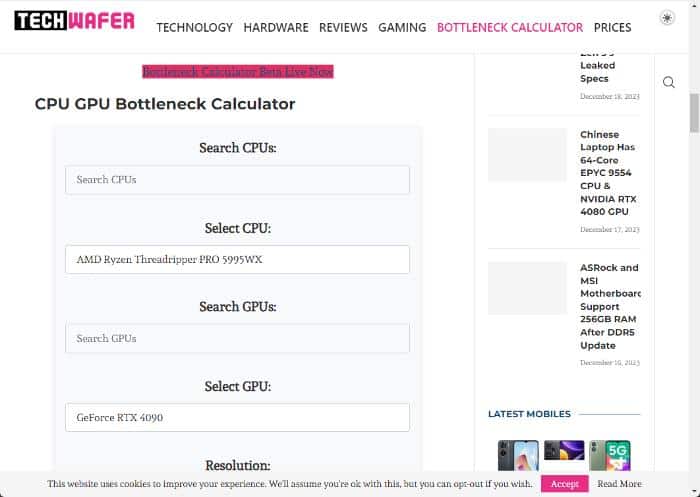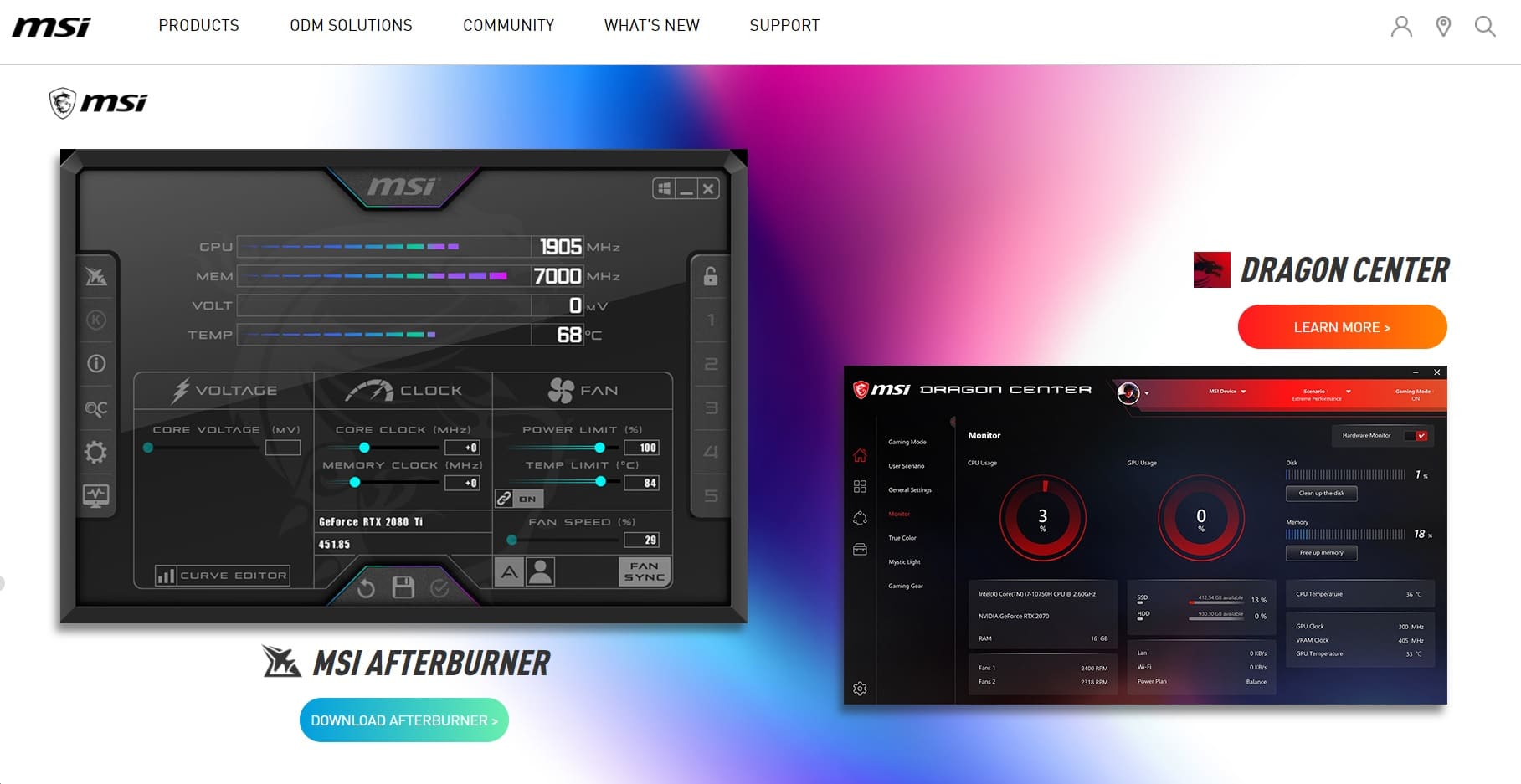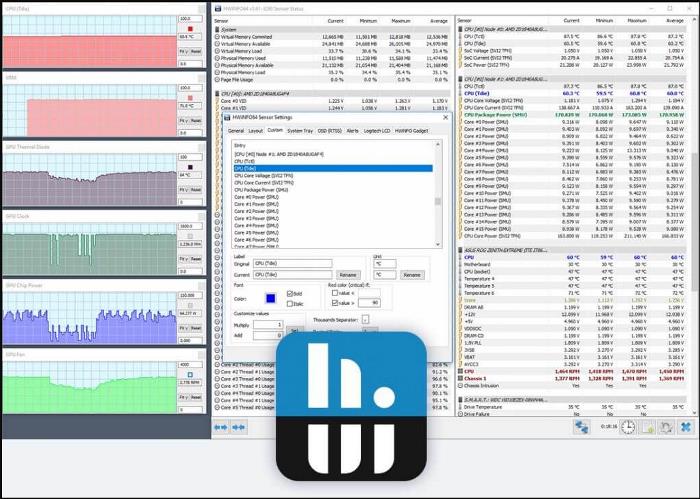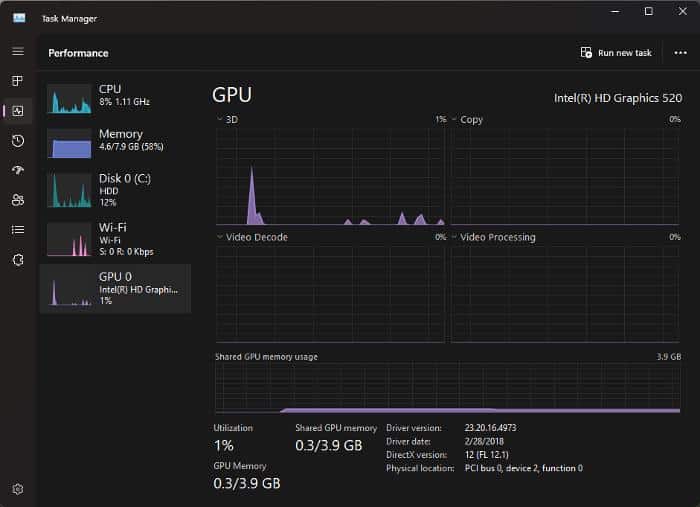Looking for the best bottleneck calculator for PC? This article provides concise discussions on them, along with essential information for calculating bottlenecks on your computer.
Getting optimal performance on PCs involves considering various factors. One crucial factor to consider is preventing any hardware component from bottlenecking another.
For instance, a CPU bottleneck on the GPU can significantly affect the overall performance of the PC especially when you are running a program that requires a lot of GPU power.
To identify potential bottleneck hardware on a PC and address issues like freezing, lag, and crashes caused by bottlenecks, it’s common to examine resource usage during program execution.
This analysis can be carried out using utilities like Task Manager or specialized resource monitoring software such as MSI Afterburner.
However, using a specialized bottleneck calculator often complements the aforementioned method by employing algorithmic analysis to calculate PC bottlenecks.
That’s why we’ve created this article to review the best PC bottleneck calculators for PC including all the methods above, helping you in pinpointing any hardware limitations in your system.
Table Of Contents
Understanding the concept of a bottleneck in a PC
Bottleneck is a generic term but when it comes to computing, it refers to a PC component — be it CPU, GPU, RAM or disk driver — that limits or slows down the overall functioning of the computer.
This occurs when a particular hardware component struggles to process data requests at a pace comparable to the data reception capacity of the hardware awaiting the information.
An instance of CPU bottleneck affecting the GPU arises when the CPU impedes the smooth flow of requests to the GPU, probably when gaming. In such a scenario, the CPU experiences high utilization, while the GPU operates with a utilization below the norm.
This bottleneck restricts how the GPU should handle requests for the optimal running of processes, leading to issues like lags, crashes, stuttering, and low FPS.
While bottleneck may be a simple term, it is most times the cause of issues faced on PCs. Hence, it is very important to take note of it. And the bottleneck calculator below can be of help in getting bottlenecks on your computer.
Best Bottleneck Calculators for PC
As previously noted, there are tools available to help in identifying hardware bottlenecks on PCs. This helps pinpoint which components may require overclocking or replacement to enhance data/request processing on your computer.
Below are the top options derived from our extensive testing. However, the first four recommendations are best to be used if you are just planning to build a PC and the last three can only be used post PC build.
1. PC Built Bottleneck Calculator
PC Built Bottleneck Calculator is one of the top platforms to calculate PC bottleneck before building a PC.
This site allows you to select some parameters to help determine possible bottlenecks on the PC.
It prompts users to select their processor, graphics card, screen resolution, and the primary purpose of the PC – whether it’s for running CPU-intensive processes, GPU-intensive processes, or general processes.
It then proceeds to calculate whether the PC components combination is best suited for your selected PC purpose or not.
Also, in a case when it notices a possible bottleneck in the combination, it recommends other products that can be used instead and give you the performance you want.
2. CPU Agent Bottleneck Calculator
CPU Agent Bottleneck Calculator is a platform you can use to calculate possible bottlenecks whenever you want to build a PC.
It allows you to choose from its long list of hardware components where you will most likely find the CPU, GPU, and other components you want to use in building your PC alongside their price tags.
The input required to be selected by this bottleneck calculator includes CPU, GPU, RAM size, RAM speed, resolution, and quality Settings.
It then gives detailed information on the performance and specifications of your selected PC components. Alongside that, it shows you the selected hardware usages for 6 different games to use as a judge on whether one will be a bottleneck on another.
Overall, it is a great site to find insight into hardware components you want to use when building a PC.
3. Build Redux
Want to build the best PC for yourself and avoid bottlenecks? Build Redux is a platform we will recommend you visit to get the best recommendation of the hardware components to build your PC.
This site is known as one of the best PC manufacturers but has the option to present users with components that are best for each other to avoid bottlenecks and provide the best performance.
This platform allows you to take into consideration the processes you want to run on the PC and use that to find the best hardware component to run those processes efficiently without bottlenecks.
It is mainly tailored towards gaming. However, it can be used to find the best PC components to use for related processes.
4. Techwafer Bottleneck Calculator
Techwafer Bottleneck Calculator employs an advanced algorithm to predict a given CPU and GPU combinations that will result in bottlenecks in a computer. The platform is reliable to a great extent and can be used to get an idea of how a particular GPU and CPU will perform when being used together in a PC.
Its selection of GPU and CPU products is quite massive as you will most likely find the products you want to use to build your PC on it making it easy to test bottlenecks for those products.
It is very straightforward to use and gives suitable recommendations after calculating the bottleneck for your selected CPU and GPU Products.
5. MSI Afterburner
MSI Afterburner is a resource monitoring tool that gets and shows the utilization of PC components such as CPU, GPU, and RAM. It is a very popular and effective tool that can be your go-to to calculate bottleneck on your PC while running programs like games.
It not only works for MSI hardware so even if you are using an AMD component, you can still use the tool.
Basically, you need the PC component utilizations it shows to find bottlenecks on your computer. The approach you can use to calculate bottleneck on a PC with MSI Afterburner will be discussed in a later section of this article.
6. HWiNFO
HWiNFO like MSI Afterburner is also a resource monitoring that gives you the usage stats of your PC hardware components. With this program, keeping track of how each of your PC components behaves will be very easy and hence, you can use those stats to find bottlenecks on the computer.
It gives detailed stats on the utilization of the CPU, GPU, and other components. So whenever you want to find possible bottlenecks on your computer, simply open HWiNFO and use it to trace the hardware slowing down the PC.
7. Task Manager
The last on our list and the most ideal bottleneck calculator is the Task Manager. It is a built-in Windows interface that allows users to keep track of utilizations for the hardware components on the PC.
This includes the RAM, CPU, GPU, and even the disk. If you don’t want to download the resource monitoring tool mentioned above to gauge your PC performance and find possible bottlenecks, simply use the Task Manager.
How to use bottleneck calculators on PC?
To find possible bottlenecks when trying to build a PC, follow the steps below:
1. Choose any of the first four bottleneck calculators we covered above and visit the site.
2. Select the specs for the PC components for which you wish to determine the bottleneck. This can include the model and specifications of your CPU, GPU, RAM, and display resolutions. You may also be required to select the purpose of the PC whether it’s for general, CPU-intensive, or GPU-intensive uses.
3. Now, proceed to run the bottleneck calculator and the platform will analyze the details you’ve input to get any component that’s weaker for your selected use and may consequently cause bottlenecks for other components.
4. If it finds any bottleneck, you will have to find a more suitable component to replace the bottleneck component.
In case you want to find a bottleneck on a system you’ve already started using:
1. Right-click on the taskbar and select Task Manager. You can also use HWiNFO or any other resource monitoring tools.
2. On the Task Manager window, select the Performance tab. You will see the utilization for each hardware on your computer on the resulting page.
3. If you observe a significant disparity in the utilization of the CPU and GPU, for instance, with the CPU utilization at 95% and the GPU utilization at 30% in a process that typically demands high GPU power, it suggests that the CPU could be a bottleneck.
Note: CPU-bound and GPU-bound events are frequently mistaken for bottlenecks on PC. Those cases occur when specific tasks inherently demand higher CPU or GPU usage, creating the impression of a hardware bottleneck. It’s crucial to consider this when assessing whether your PC has bottlenecks or not.
Can I rely solely on PC Bottleneck Calculators?
Although a bottleneck calculator can provide insight into potential bottlenecks on a PC, it should not be the sole determining factor. Each calculator employs a specific approach that may overlook certain factors, such as in-app resource usage configurations.
Therefore, it is essential to exercise manual judgment and consider various aspects to accurately identify whether there is any bottleneck on your PC or not.
What Hardware Can Be Bottlenecked?
Below are the hardware components in a PC that usually become a bottleneck and affect the performance of the PC:
CPU: The Central Processing Unit (CPU) is responsible for executing program instructions, performing calculations, and overseeing data flow, which plays a pivotal role in a system. If the CPU experiences a bottleneck, it restricts the system’s processing capabilities, impacting overall computer performance.
GPU: The Graphics Processing Unit (GPU) is responsible for handling graphics tasks like image and video rendering, as well as general graphics computation. Common applications include gaming, video editing, and 3D rendering. If the GPU becomes a bottleneck, tasks requiring graphics processing may experience disruptions, as the transfer of data to other components in the PC is slowed down.
RAM: The Random Access Memory (RAM) temporarily stores data for quick access by the CPU. If there’s a bottleneck in the RAM, it hinders the CPU’s operation and, consequently, impacts the overall performance of the PC.
Disk Drive: The disk drive is responsible for storing both data and the operating system. If the read/write speed of the drive is sluggish, suggesting a bottleneck, you may encounter performance issues with the overall functioning of the computer.
Is 20% CPU bottleneck bad?
CPU bottleneck percentage is relative to the process being run on the PC whether it is a CPU-intensive program or GPU-intensive. So whenever you are calculating bottlenecks on a PC take consideration of what hardware component the process heavily relies on.
Wrap Up
Bottleneck calculators for PCs are commonly perceived as entirely trustworthy, but the reality is that they aren’t designed to be foolproof.
Although they offer details about the hardware components in a PC and help identify potential bottlenecks, it’s crucial to verify their accuracy through thorough research.

